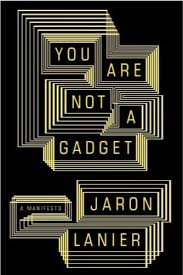 I just finished reading Jaron Lanier’s wonderful new book titled “You Are Not a Gadget.” In it, one of the topics he discusses is the increasing “mash-up” nature of the new digital age. In particular, he speaks of a not-too-distant future when words could lose their contextual nature in long form. Rather, snippets of written works will become the normal way that readers will encounter new ideas, instead of the fully formed work of a single author.
I just finished reading Jaron Lanier’s wonderful new book titled “You Are Not a Gadget.” In it, one of the topics he discusses is the increasing “mash-up” nature of the new digital age. In particular, he speaks of a not-too-distant future when words could lose their contextual nature in long form. Rather, snippets of written works will become the normal way that readers will encounter new ideas, instead of the fully formed work of a single author.
This recent article speaks of the same phenomenon (and of Lanier’s book). It’s called Text Without Context, and New York Times reporter Michiko Kakutani reviews a novel from writer ?? who covers the same subject. “Mr. Shields’s pasted-together book and defense of appropriation underscore the contentious issues of copyright, intellectual property and plagiarism that have become prominent in a world in which the Internet makes copying and recycling as simple as pressing a couple of buttons. In fact, the dynamics of the Web, as the artist and computer scientist Jaron Lanier observes in another new book, are encouraging “authors, journalists, musicians and artists†to “treat the fruits of their intellects and imaginations as fragments to be given without pay to the hive mind.â€
More from the review: “It’s not just a question of how these “content producers†are supposed to make a living or finance their endeavors, however, or why they ought to allow other people to pick apart their work and filch choice excerpts. Nor is it simply a question of experts and professionals being challenged by an increasingly democratized marketplace. It’s also a question, as Mr. Lanier, 49, astutely points out in his new book, “You Are Not a Gadget,†of how online collectivism, social networking and popular software designs are changing the way people think and process information, a question of what becomes of originality and imagination in a world that prizes “metaness†and regards the mash-up as “more important than the sources who were mashed.â€
I agree with Lanier’s call for a review of how technology is shaping our lives. Like Lanier’s book, Kakutani’s essay in the Times does a good job of outlining some of the issues and what’s at stake. It’s more than simply planting one’s feet in the ground in resistance to change. Fundamental questions must be asked (and answered) ass society comes to adopt new information technoolgy and practices. I encourage you to read the entire essay.





